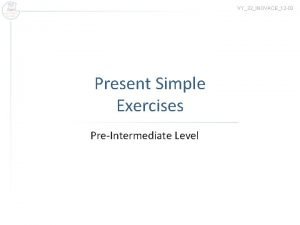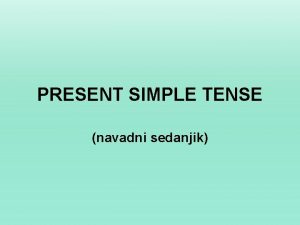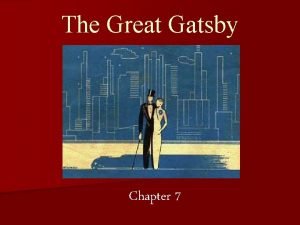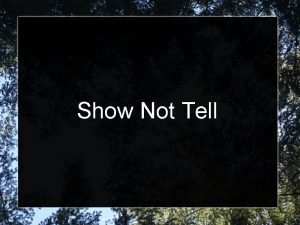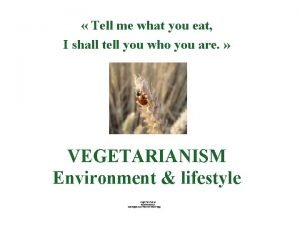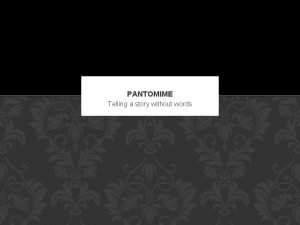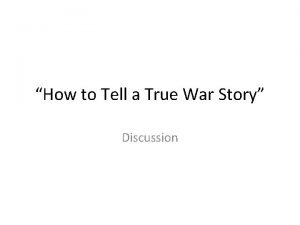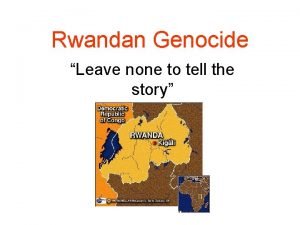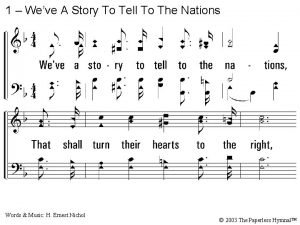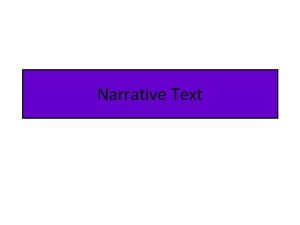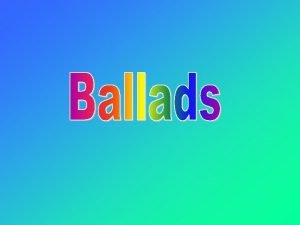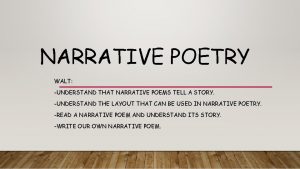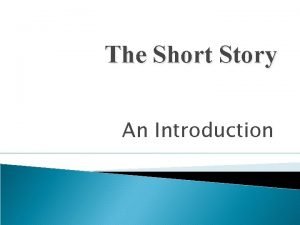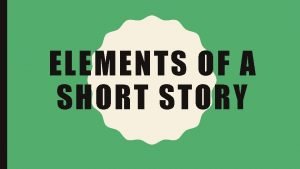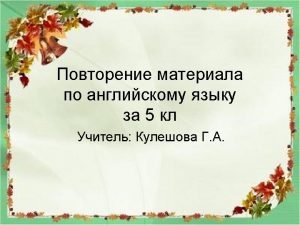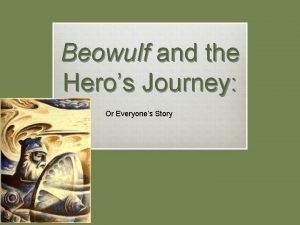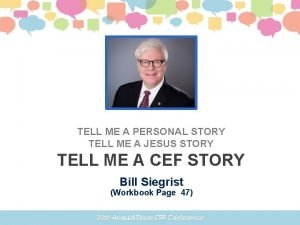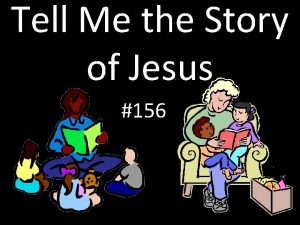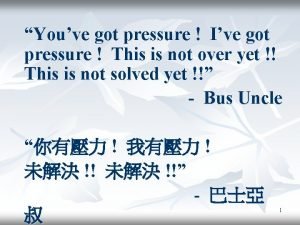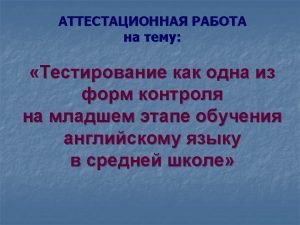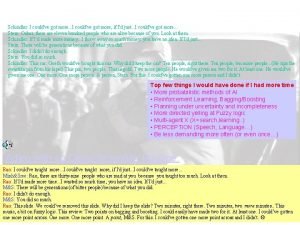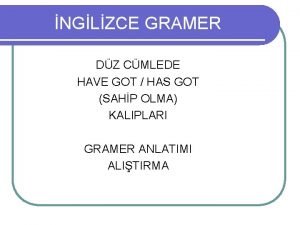Everyones got a story to tell To tell





















- Slides: 21

Everyone’s got a story to tell

� To tell a story � A good story has a beginning, middle, end � Time is fluid in a story—a story could tell of an event that occurred in just a few minutes or over the course of a day or more

§ Middle/Climax � Beginning End

� Beginning sets the environment and the characters � All action should be driving towards the big, climactic moment � Ending should resolve the issues, even if it doesn’t offer a nice, neat ending

� Situation: background/context (Beginning) � Conflict: problem could be with another person, circumstances/society, nature, self � Struggle: manner of dealing with conflict, isn’t necessarily physical (Climax) � Outcome: result of the struggle (End) � Meaning: the significance or bigger picture, which could be deeply philosophical or simple, stated or implied

� Slow down a moment in your story by adding more sensory details or dialogue “She latched onto my head with her hand shoved me first behind the washing machine, but I couldn’t fit within the small space. She then grabbed and moved me to hide behind the toilet. ” � Speed up the narrative by explaining what happened rather than detailing it step by step “My sister and I hid. ”

Topic + assertion For description: Person/place/thing + dominant impression For narration: Event to be narrated + how you feel about the event/why it’s significant

My senior graduation party was unforgettable. Event : my senior graduation party How you felt: it was unforgettable Remember to avoid statements of fact and focus your event! NOT: I graduated in June 2009.

� 1. Playing Nintendo everyday with my sister. � 2. In Mexico, I had to walk to school for 30 minutes each way because it was so far away. � 3. Staying with my friend Dixie last summer was memorable. � 4. My nineteenth birthday party was the best one ever. If you don’t like the TS, think about how you’d fix it.

� � 1. Playing Nintendo everyday with my sister. Not a sentence. Also, this is a daily event rather than a specific event. 2. In Mexico, I had to walk to school for 30 minutes each way because it was so far away. This is more of a statement of fact than a TS. Again, it was a daily event. Another way to think about it is to focus on one particular day or event that occurred when the person was walking home. For example, “I will never be able to forget the day that a pitbull chased me home from school. ” 3. Staying with my friend Dixie last summer was memorable. This is a pretty good TS but memorable could be good and bad and it might be stronger to focus on one particular event during the summer to narrow the topic down. 4. My nineteenth birthday party was the best one ever. This is a focused TS with a clear assertion. We know what the event is and we know how the writer feels about it.

� For descriptive paragraphs, you focused on sensory details and concrete examples. � For narratives, you want to do the same but also answer these kinds of questions: � Who What When � Where Why How

� Narratives are usually ordered chronologically (by time) � Transitions for signaling time: � First, now, then later, soon, suddenly, afterward, meanwhile, often, etc. � Write narrative in past tense, usually first person

� Provides a satisfying closing to the story. � Could provide a lesson learned � Wraps up loose ends

� Dialogue helps to create emphasis � Dialogue helps to characterize someone � Dialogue helps the reader feel present in the story � Compare 1 and 2: 1. I caught up with her and said, “Excuse me, but you parked in a handicapped spot. ” She just looked at me and said she was handicapped because she had 3 kids. 2. I caught up with her and said, “Excuse me, but you parked in a handicapped spot. ” She just looked at me and said, “I am handicapped. I have 3 kids. ”

� Use dialogue when the words the person says are unique or adds to the story. � YES: Mohammed Ali says, “Float like a butterfly, sting like a bee. ” � NO: I said, “Hello. ” My friend said, “Hi. ”

� Dialogue contains 3 things: 1. speaker 2. exact words 3. quotation marks. � How dialogue is punctuated depends on where you place the speaker and exact words.

� Jason asked the teacher, “Don’t you ever get sick? ” � Mimi said, “I food poisoned myself again last night. ”

� “I didn’t see the end of the movie, ” Lulu explained. � “When are we going to get a break? ” the students wondered.

� “Why is it, ” Tony wondered, “that people who drive under the speed limit always insist on driving in the fast lane? ” � “I’m sure I did the homework, ” Clarice stated. “I just can’t find it. ”

� Be careful that what you put in quotes is the EXACT words. If you are reporting what someone else says, do not use quotes. The word “that” is often a clue to reported speech. � Exact words: After eating one too many hot dogs, Mateo said, “I don’t feel good. ” � Reported speech: � After eating one too many hot dogs, Mateo said that he didn’t feel good.

� Speaker at start � Write a sentence that includes a statement your teacher has said to you. � Write a sentence that includes a question a waiter might say. � Speaker at end � Write a sentence that includes a question you might ask your doctor. � Write a sentence that includes words you might think to yourself when stuck in traffic. � Speaker in the middle � Write a sentence a grandparent might say. Use the words “When I was…” to begin the exact words. � Write two sentences that you might say to a classmate before an exam.
 Everyones doing it
Everyones doing it Have got y has got
Have got y has got Present simple exercises intermediate
Present simple exercises intermediate Have got has got pravila
Have got has got pravila What does gatsby say to nick when the party is over?
What does gatsby say to nick when the party is over? Show not tell writing
Show not tell writing Tell me what you eat and i shall tell you what you are
Tell me what you eat and i shall tell you what you are Telling a story without words
Telling a story without words How to tell a true war story discussion questions
How to tell a true war story discussion questions Look and guess
Look and guess I love to tell the story
I love to tell the story Leave none to tell the story
Leave none to tell the story What does the story mainly tell us about
What does the story mainly tell us about Read remember this. put the words in the correct order.
Read remember this. put the words in the correct order. We've a story to tell to the nations
We've a story to tell to the nations Narrative purpose examples
Narrative purpose examples A song transmitted orally which tells a story
A song transmitted orally which tells a story Let me tell your story
Let me tell your story A poem that tells a story.
A poem that tells a story. ملخص قصة the tell-tale heart
ملخص قصة the tell-tale heart Example of short story
Example of short story Short stories definition
Short stories definition


